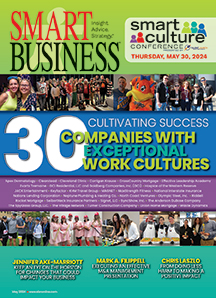But even with the turmoil, Point Park had built up a strong enough balance sheet that Hennigan says they decided to move forward and just slow down a couple of the projects.
“We didn’t stop them; we just slowed them down a little bit, and we were very incremental,” he says. “We weren’t swinging for the fences. We were happy to take singles and doubles and just work our way around the bases, so to speak.”
Poke holes along the way
Following your vision to growth is never easy, and it isn’t without risk.
As an example, Hennigan says of all of the property acquisitions, the one that felt the most risky was property that spans Forbes Avenue to Fourth Avenue, between Smithfield and Wood streets. It was “really the rotting core of downtown Pittsburgh at the time” but ultimately ended up being the site of the new Pittsburgh Playhouse.
One way to mitigate risk is through comprehensive data.
“We measure everything we do — all of the learning,” Hennigan says.
In addition, make sure you have a good board that will challenge all of your assumptions and poke a lot of holes in your data, he says.
Another way Point Park reduces risk is by working to increase value. By understanding that the campus is the city, the university’s students can take advantage of the access to internships, professional opportunities and part-time jobs.
“We wrap ourselves around our students and give them the support that they need,” Hennigan says. “We demonstrate to them what the value of a Point Park education is. We provide them with outstanding teaching and outstanding facilities. We provide them with real-world experience through internships.”
By showing the community what you’ve created, he says you prove the value of the college socialization process to undergraduates, who are developing through their final stage of adolescence.
But the risk always exists. After all, it was only recently that Hennigan begin to feel that Point Park had made the right decision to stay downtown.
“When we saw all of the reinvestments in downtown ramp up as significantly as it has done in the past five years; when it was clear that we were staying and PNC had made their decision to build a couple buildings and put their world headquarters right in the heart of downtown Pittsburgh; and we saw all of this out-of-town investment in commercial as well as residential properties, I think we began to start to feel good about our decision” he says.
And while that decision paid off, the university’s leadership is already sweating out its next strategic plan.
The Internet has been such a huge disrupter for so many industries, including higher education, he says. Students are learning differently, both millennials and the digitals — kids that were born with a gadget in their hand, who used iPads in elementary school.
Hennigan says they have to think 15 years out in order to figure out where they are going.
“We have to. Because the digitals right now are around 12, 13, 14 years old,” he says. “That’s the generation that’s going to have the next profound effect on the delivery of higher education.”
Takeaways:
- When building an identity, don’t take anything for granted.
- Implement an ambitious vision in small chunks.
- Challenge your assumptions and poke holes along the way.
The Hennigan File:
Name: Paul Hennigan, Ed.D.
Title: President
Company: Point Park University
Born: Pittsburgh
Education: Bachelor’s in political science from Edinboro University of Pennsylvania, a master’s in public administration from the University of Pittsburgh’s Graduate School of Public and International Affairs, a doctor of education degree from the University of Pennsylvania
What was your first job and what did you learn from it? It was a summer job cleaning the school, the Catholic school and church that I attended, mopping the floors, painting the walls, all that kind of stuff. I certainly learned the value of work, at an early age, and just the sense of responsibility.
And I had to ride my bike to and from work. It was tough at the time. Now, I would happily ride my bike to and from work.
What’s the best business advice you’ve ever been given? You don’t know what you don’t know. It’s become who I am. You surround yourself with smart people, and listen and find the themes and go forward.
You worked for the mayor in the 1990s. What was the biggest thing that you learned as the chief financial officer of Pittsburgh? Well, the biggest thing that I learned from Mayor Murphy was how to create and inspire vision, because he was an incredible visionary. And you can see the fruits of his labor all over Pittsburgh now.
What I learned about my job, being the chief financial officer, was how important accurate financial forecasting, reporting and due diligence are to any organization.
If you weren’t a university president, is there another job that you’d like to try? I’d like to sell ice cream on the beach.
Truthfully, I’m intrigued with private equity. I would like to sell ice cream on the beach at some point, but before that happens, the world of private equity, I think, is an interesting world.

